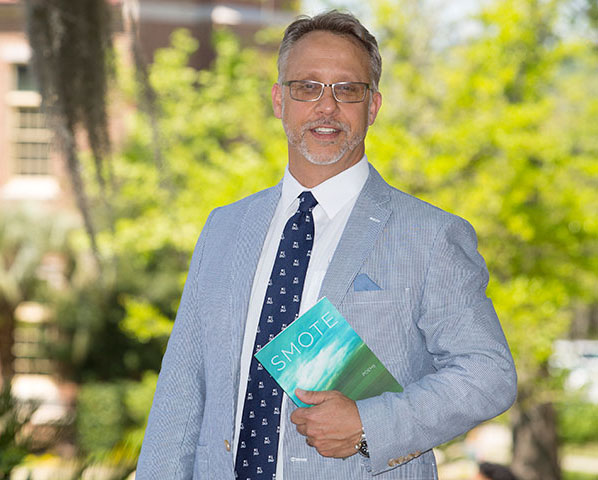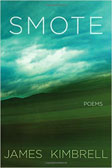Jimmy Kimbrell Wins NEA, Guggenheim Fellowships

As 2016 neared its end, English Professor Jimmy Kimbrell found out he will have additional time to work on his newest collection of poetry, Flea Trap: an National Endowment for the Arts Fellowship accompanied Kimbrell’s Guggenheim Fellowship, which he won in April 2016.
This is Kimbrell’s second NEA award, after winning one in 2004. He is one of 37 winners for 2017, chosen from a field of about 1,800 applicants.
“It is a tremendous honor to be among this year’s NEA Fellows,” Kimbrell told fsu.edu. “There’s no better affirmation and encouragement than to be selected by a panel of one’s peers.”
* * *
Below is the original article from April 2016 about Kimbrell winning a Guggenheim Fellowship.
Winning a highly coveted award is the culmination of a complicated process for the recipient. English Professor Jimmy Kimbrell knows this scenario well, considering his selection as a 2016 Guggenheim Fellow.
"The application process was intense and required the sort of materials that one might put together for promotion – outside letters and statements of purpose, etc.," says Kimbrell. "Guggenheim guidelines required all my previous books of poetry, so I sent my first collection, The Gatehouse Heaven, my second collection, My Psychic, and my most recent collection, Smote."

Kimbrell also received suggestions and help from department colleagues who have won a Guggenheim Fellowship.
"I received good advice along the way from Robert Olen Butler, David Kirby, and Barbara Hamby," Kimbrell says. "Of course, even for former recipients, the judging process and the arcana around that process is something of a mystery. But Bob, David, and Barbara were always encouraging, always willing to share their experiences, and that made a big difference to me."
Kimbrell says he is grateful for their feedback, which helped him put together a "thoughtful, thorough application."
"They also stressed the importance of not worrying about it too much once the application is submitted; in other words, control what you can, let go of the rest, and that's what I did," he says.
The John Simon Guggenheim Memorial Foundation announced on April 6 this year's 178 fellows, chosen from a group of about 3,000 applicants throughout the U.S. and Canada.
"These artists and writers, scholars and scientists, represent the best of the best," Edward Hirsch, president of the foundation, said in a press release. "Each year since 1925, the Guggenheim Foundation has bet everything on the individual, and we're thrilled to continue to do so with this wonderfully talented and diverse group. It's an honor to be able to support these individuals to do the work they were meant to do."
The initial sign that he was at least being considered for the honor was a few weeks before the official announcement, when Kimbrell received an email stating that his name had been forwarded to the final committee. Still, he was not sure this meant that he had won, and he did not mention the message to his wife until later that night.
"Of course, after that, we read the email a thousand times in an effort to determine whether I'd won," he says. "Another email asked for additional information and it started to seem very likely that I was a winner."
The day before the news became official, Kimbrell received Hirsch's award letter, "thereby making it impossible for me to convince myself that I was only imagining things and that, indeed, I'd been selected as a Guggenheim Fellow," Kimbrell says. "The news, obviously, was uplifting, a great boost, and now that it's finally sinking in, it feels like a great source of encouragement and support for the work ahead."
The next steps for Kimbrell currently are being planned. He is working with Professor Eric Walker, chair of the English department, and College of Arts and Sciences Dean Sam Huckaba to arrange an estimated nine-month leave from teaching and other duties so he can focus on his new collection of poems, tentatively titled Flea Trap. Kimbrell is confident that the final decision will suit both his needs and the needs of the English department.
"Like all professors in our department, I'm accustomed to juggling teaching and administrative duties with my creative and scholarly pursuits, but I'm at a place now with my new work that has positioned me to take full advantage of focusing solely upon my writing and I'm looking forward to that opportunity," Kimbrell says. "Of course, I'll continue to work with graduate students during this time, especially with those that I'm directing, but work at that level has always been more of a source of stimulation and inspiration than anything else and has, at this point, become a fundamental and vital part of my own creative process."
Kimbrell's creativity has garnered numerous fellowships before he won the Guggenheim award. He has won fellowships from the National Endowment for the Arts, the Ford Foundation, and the Florida Arts Council – all of which required him to go through an application process – but says he has been lucky enough to receive fellowships that required no application such as the Whiting Award and the John and Renee Grisham Fellowship at the University of Mississippi.
Some writers say their end goal is to be happy with their work and not necessarily to win awards. Kimbrell says it is obvious that the writing is always the central focus, and the place where writers spend ninety-five percent of their time and energy. The other five percent, he says, is spent on submitting poems to journals and applications for fellowships and funding.
"You'll never hear me saying that awards don't count," he says. "They do count, the question is what they count for."
He points out, for example, that a fellowship on the level of a Guggenheim is a gift.
"It serves as encouragement, support, and brings also the special gift of time in which to write," he continues. "So, yes, I'm delighted by the recognition, but that's not the point. The point is to use the gifts that have been given to me in order to move forward in this story that I'm living and to confront whatever obstacles lie ahead with courage, confidence, and determination."
Walker says that the significance of Kimbrell's achievement extends beyond the English department and Florida State University.
"These awards are one of the major national markers of academic accomplishment and are very difficult to get," Walker said. "It certifies the stature of Jimmy's work and is an excellent indication of great promises ahead."

